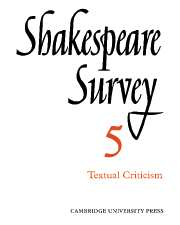Book contents
- Frontmatter
- Restoring Shakespeare: The Modern Editor’s Task
- Suggestions Towards an Edition of Shakespeare for French, German and Other Continental Readers
- The 1622 Quarto and the First Folio Texts of Othello
- An Approach to the Problem of Pericles
- The Shakespeare Collection in the Library of Trinity College, Cambridge
- New Place: The Only Representation of Shakespeare’s House From an Unpublished Manuscript
- Letters to an Actor Playing Hamlet
- Shakespeare’s Imagery: The Diabolic Images in Othello
- Suggestions for a New Approach to Shakespeare’s Imagery
- Shakespeare’s Influence on Pushkin’s Dramatic Work
- Shakespeare on the Flemish Stage of Belgium, 1876–1951
- International Notes
- Shakespeare Productions in the United Kingdom: 1950
- Shakespeare in the Waterloo Road
- The Year's Contributions to Shakespearian Study 1 Critical Studies
- 2 Shakespeares’s Life, Times and Stage
- 3 Textual Studies
- Books Received
- Index
- Plates
The Year's Contributions to Shakespearian Study 1 - Critical Studies
Published online by Cambridge University Press: 28 March 2007
- Frontmatter
- Restoring Shakespeare: The Modern Editor’s Task
- Suggestions Towards an Edition of Shakespeare for French, German and Other Continental Readers
- The 1622 Quarto and the First Folio Texts of Othello
- An Approach to the Problem of Pericles
- The Shakespeare Collection in the Library of Trinity College, Cambridge
- New Place: The Only Representation of Shakespeare’s House From an Unpublished Manuscript
- Letters to an Actor Playing Hamlet
- Shakespeare’s Imagery: The Diabolic Images in Othello
- Suggestions for a New Approach to Shakespeare’s Imagery
- Shakespeare’s Influence on Pushkin’s Dramatic Work
- Shakespeare on the Flemish Stage of Belgium, 1876–1951
- International Notes
- Shakespeare Productions in the United Kingdom: 1950
- Shakespeare in the Waterloo Road
- The Year's Contributions to Shakespearian Study 1 Critical Studies
- 2 Shakespeares’s Life, Times and Stage
- 3 Textual Studies
- Books Received
- Index
- Plates
Summary
Only a small number of substantial critical studies has become available for review in the period here covered. It seems likely that the increasing difficulties of publishers on both sides of the Atlantic are in part the explanation of this, since it is clear from the quantity of work appearing in journals that the race of Shakespearian commentators is in no danger of dying out. Nor do the commentators appear in any danger of running short of material, since they enjoy a constantly increasing scope in the discussion of one another’s views. If, as is probable, the journals are soon constrained to further economies in point of space, these writers will do well to sacrifice, in the first place, the element of elaborate debate which is at present fashionable among them. Critical essays now frequently take the form of a progress through veritable thickets of contemporary opinion, so that the total effect is of little more than a babel of voices. A laudable sense of academic courtesy is one factor predisposing to this, as is also, perhaps, an influence from techniques of investigation that have proved notably successful in the natural sciences. But to read extensively in interpretative studies conducted in this manner is to experience a mild intellecutal claustrophobia—or even a feeling that one is missing a good deal of the play as a result of the earnest, if not always lively, conference being conducted in the stalls. Many of those who write about Shakespeare might with great advantage—at least to themselves—write more directly. The hard fact is that when the impulse to do so is in abeyance the likelihood of interesting communication is small.
- Type
- Chapter
- Information
- Shakespeare Survey , pp. 129 - 137Publisher: Cambridge University PressPrint publication year: 1952



